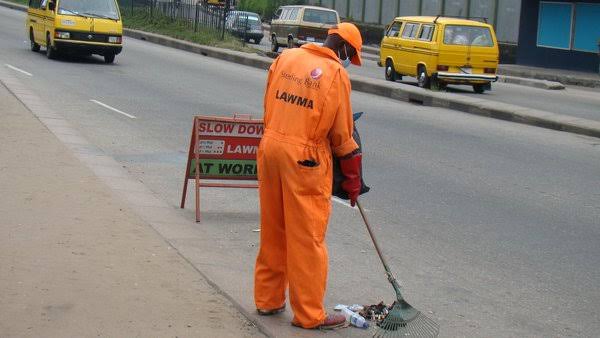Lagos State is one of the few states that quickly rolled out the N70,000 minimum wage when it was passed into law. But its skewed application of the benchmark to the exclusion of Lagos street sweepers, who still earn below 50 per cent of the threshold monthly, robs it in on the group that deserves a lot more, BERTRAM NWANNEKANMA reports.
For quite some time, street sweepers engaged by the Lagos State government to keep major streets and highways in the former Nigerian capital free of refuse and silt have been grumbling over what they term poor and inhuman working conditions until one of them recently launched an online protest. One of the major complaints, which she levelled, is that some of them earn below N40,000 monthly, which is not even paid regularly.
In the viral video, the sweeper, who did not reveal her name, accused her supervisors of shortchanging her colleagues and failing to implement the approved salary structure.
She alleged that despite reports that their salary had been increased to N85,000 since August 2024, sweepers continued to receive a miserable N30,000 monthly, without allowances and necessary working tools.
The sweeper also raised concerns over salary delays, noting that their previous monthly wages often arrived in the middle of the new month. Beyond the financial struggles, the cleaner lamented the dangerous conditions under which street sweepers operate, revealing that at least three of her colleagues lost their lives last year.
“One person died from the shock of a trailer horn, while two others died after developing complications from inhaling dust. We want you to make an amendment,” she pleaded. Since the passage of the 2024 National Minimum Wage Amendment Act by the National Assembly in July 2024, debates have persisted over whether workers in the informal sector and those under contractual arrangements involving multiple parties, such as street cleaners, should be included in the new wage structure.
However, Senate President Godswill Akpabio clarified that all employees in the country, including domestic and casual workers, must be paid the new national minimum wage of N70,000.
The Permanent Secretary in the Ministry of Labour and Employment, Kachollom Daju, was also quoted in the report as saying that it was a crime for any employer to pay less than N70,000 to any worker.
Labour leaders and lawyers, among others, have also criticised the idea of certain Nigerian workers being exempted from benefiting from the national minimum wage due to their hours of service.
They argue that the national minimum wage law does not consider hours worked.
While street sweepers do not expect the same salary as graduates, they perform critical tasks, such as keeping highways free of refuse and silt and contributing to ridding society of filth.
During their assignments, some sweepers have either been injured or killed by reckless drivers, even as they lack pension or gratuity after several years of service. And as of Friday, May 16, 2025, The Guardian gathered that some sweepers had not received their April salary.
However, the Lagos State government, in response to the outcry, issued a statement explaining that the sweepers were engaged through private companies under “structured contracts” and that those private companies “are responsible for directly paying their engaged sweepers.”
The Managing Director of the Lagos State Waste Management Authority (LAWMA), Dr Muyiwa Gbadegesin, in putting the records correctly said: “It is untrue that the government does not care about the street sweepers,” adding that the sweepers enjoy welfare benefits, wage adjustments and healthcare access like government staff and that they were targets of empowerment schemes.
On the N40,000 monthly pay, he said: “If they were full-time staff of government, at that rate, they would be making N80,000 a month, which is N10,000 above the national minimum wage.”
In further clarifying the issue, the Commissioner for the Environment and Water Resources, Tokunbo Wahab, whose ministry supervises LAWMA, reiterated that street sweepers are not employees of LAWMA, and therefore not employees of the Lagos State government. The NLC boss, who stressed the need for a review, said: “If you want to engage them to be doing an eight-hour job, so be it, but using some people like slaves amounts to man’s inhumanity against fellow man… It’s not an ideal situation, and we need to call them out.”
Similarly, human rights lawyer and former President of the Committee for the Defence of Human Rights (CDHR), Malachy Ugwummadu, described the Lagos State government’s argument as weak, considering the vital work that the street sweepers do.
While saying that the sweepers should be placed on a special scale to reflect their contribution to society, Ugwummadu stated that the Minimum Wage Act does not speak about hours of work, but talks about the responsibility of the employer, the government inclusive, including the Lagos State government, regarding their obligation to workers under their employment.
“Therefore, if the Minimum Wage Act does not limit or circumscribe the category of workers, those sweepers, who carry out the task of cleaning the environment and ridding it of filth, are captured in the minimum wage net,” he said.
He noted that the labour law criminalises a government or individual trying to shortchange workers or run away from their responsibilities. “Also, if you take into account the risks that these low-income earners and unskilled labourers are exposed to daily, including the number of deaths already recorded, nobody will argue about a four-hour workday. When you put all of those into consideration, and consider what they go through on the streets, it is easy to conclude that they deserve fair remuneration,” he added.
Aderonke Alex-Adedipe, a lawyer with Pavestones Legal, in Ikoyi, had earlier explained that the scope of employees covered by the Nigerian Labour Act includes both clerical workers and manual labourers. She argued that the only employers exempt from complying with the Amendment Act were those whose workers were paid based on commission or piece rate, where wages depended on the quantity produced rather than the time worked.
THE GUARDIAN


